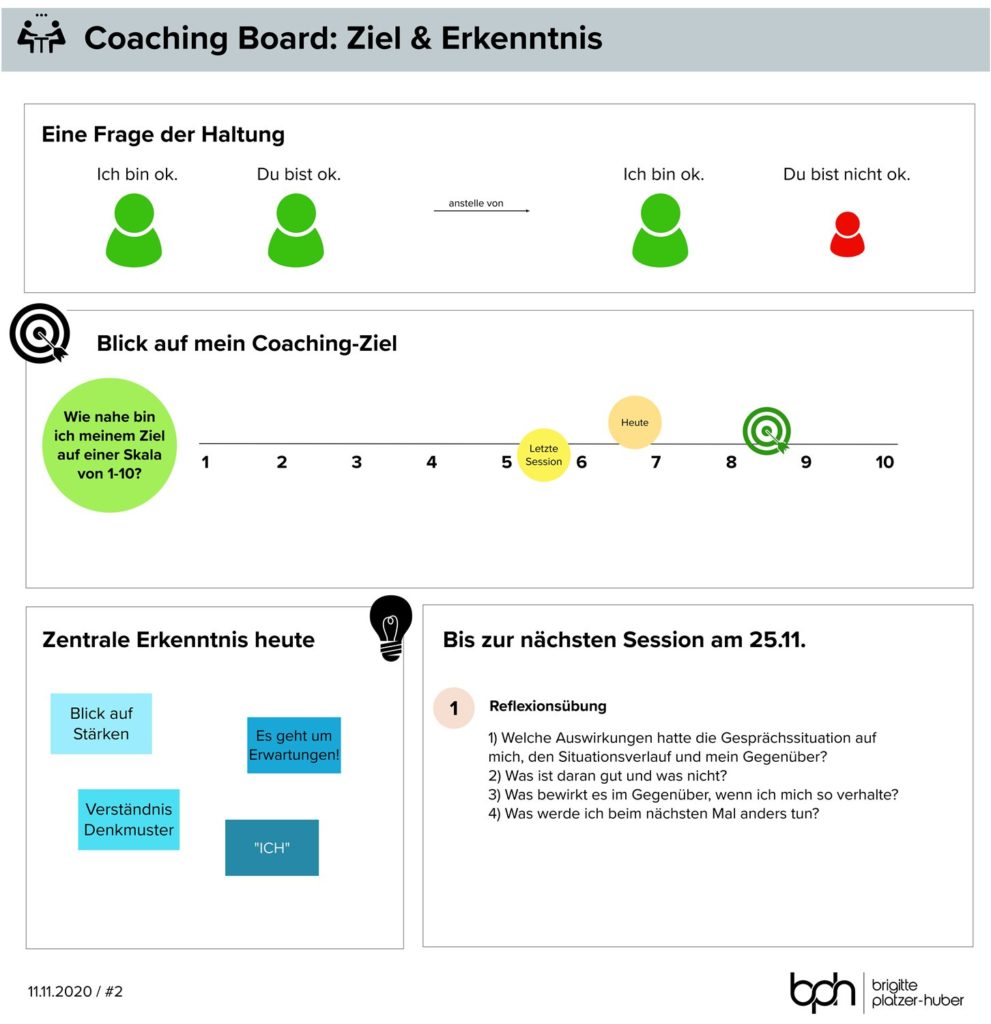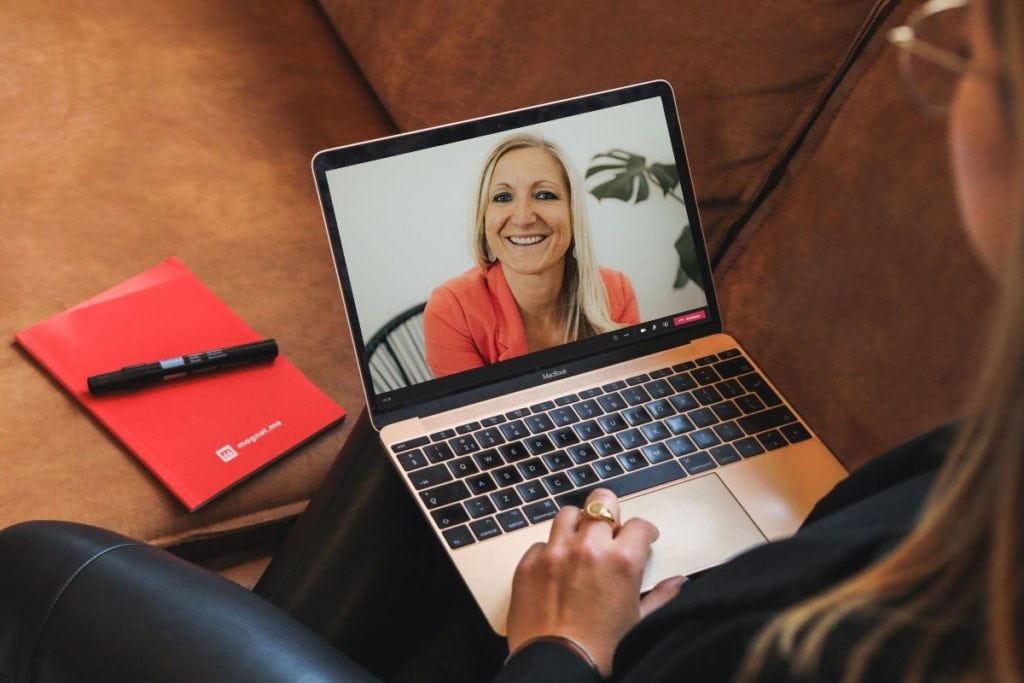Mein Business Modell habe ich von Anfang an digital gedacht – egal ob im Bereich Workshops & Trainings oder im Bereich Business & Leadership Coachings. Für diesen Weg bin ich dankbar, denn als Coach, Trainerin & Beraterin fühle ich mich mittlerweile in beiden Welten – online & offline – gut angekommen und gerüstet für die Zukunft!
Im Bereich Business Coaching fällt mir immer wieder auf, dass einige Menschen nach wie vor Bedenken haben, sich auf ein „digitalisiertes“ Coaching einzulassen. Einerseits ist da das Vorurteil, dass auf Distanz sowieso kein tiefer Austausch entstehen könne. Andererseits wird kritisch hinterfragt, ob es virtuell überhaupt möglich sei, eine Vertrauensbeziehung und echte Nähe aufzubauen. Vor allem Coachees, die bereits Erfahrung in einem Präsenz-Coaching gesammelt haben, bringen Unsicherheit oder Zweifel mit. Sie können sich kaum vorstellen, wie Online-Coaching effektiv sein kann und wie es ablaufen soll.
Online Coaching & Wirksamkeit
Es gibt immer mehr Studien, die klar aufzeigen, dass Online und Offline Coachings gleichermaßen wirkungsvoll sein können.1 Natürlich sei dazu gesagt, dass jeder Mensch anders ist – wie effektiv ein Online Coaching am Ende sein wird, hängt u.a. vom Coachee selbst ab. Wichtig ist natürlich, sich darauf einzulassen und sich der Vorteile & Mehrwerte bewusst zu werden.
Zugleich ist es für mich als Coach wichtig, trotz der Distanz völlig da und präsent zu sein, die Ängste und Sorgen in Bezug auf den „virtuellen Treffpunkt“ ernst zu nehmen und achtsam damit umzugehen. Wie im Präsenz-Coaching auch, geht es zu allererst natürlich um den Beziehungs- und Vertrauensaufbau.
Dann spielen auch meine Digitalkompetenzen als Coach eine wichtige Rolle. Diese kommen im Online Coaching ganz gezielt – aber auch dosiert – zum Einsatz.
Das heißt, ich prüfe innovative Tools und wähle sie bestmöglich aus, um sie auf eine Art und Weise einfließen zu lassen, die für meine Kunden im Prozess nicht abschreckend, sondern vielmehr einladend wirken. Sie sollen visuell unterstützen und die Reflexion zusätzlich anregen (im Bild ein beispielhaftes Coaching Whiteboard, erstellt mit MURAL).
Neben den Tools gibt es letztendlich auch eine Vielzahl an Coaching-Methoden oder Interventionsmöglichkeiten, die im virtuellen Coaching ebenfalls wunderbar funktionieren.

Emotionen im Online Coaching & unterschiedliche Persönlichkeitstypen
Was mich in diesem Jahr am meisten beeindruckt hat: Online Coaching und Gefühle… ja, das geht! Teilweise kommen Emotionen virtuell etwas schneller an die Oberfläche – je nach Zielgruppe & Persönlichkeit.
Introvertiertere Persönlichkeitstypen scheinen sich im Online Coaching leichter öffnen zu können Dies bestätigt u.a. Diplom-Psychologin Elke Berninger-Schäfer: In der virtuellen Kommunikation ist eine erhöhte und nachgewiesene Selbstoffenbarungsbereitschaft bereits gesichertes Wissen.2
In der jüngeren Zielgruppe ist das ähnlich: Die physische Distanz und gefühlte Anonymität kann dazu beitragen, dass das Coaching Gespräch bei kritischen oder sensiblen Themenfelder sehr zügig in die Tiefe geht. Diese Erkenntnis geht ebenfalls aus diversen Forschungsstudien hervor: Gewisse Persönlichkeitstypen und vor allem jüngere Menschen fühlen sich im Internet sicherer. Das „digitalisierte“ Coaching-Setting wird zum geschützten Raum und die Hemmschwelle sinkt.3
Wichtig ist mir persönlich immer eine Begegnung über Video, damit nonverbale Kommunikationssignale – zumindest im Bereich Gestik & Mimik – von beiden Seiten wahrgenommen werden können.
Fakt also ist:
Ist Online Coaching deshalb besser als Präsenz-Coaching?
Das will ich damit nicht behaupten! Dies sollte jeder für sich selbst entscheiden und im besten Falle sind dafür die Erfahrungswerte aus “beiden Welten” vorhanden. Für manche Persönlichkeitstypen mag ein virtuelles Coaching DIE Option schlechthin sein. Andere müssen erst damit warm werden oder entscheiden sich langfristig für ein klassisches Präsenz-Coaching. Schließlich stößt onlinebasiertes Coaching z.B. im Bereich der Körpersprache selbstverständlich auch an Grenzen, doch in Zeiten einer verstärkt virtuellen Zusammenarbeit und mit Blick auf #SafetyFirst, ist ein „digitalisierter“ Coaching Prozess definitiv eine empfehlenswerte Alternative.
Online Coaching FAQs
Noch mehr Erfahrungswerte und Einblicke in das webbasierte Coaching habe ich in Form eines FAQ-Bereichs für Online-Coachings auf meiner Website zusammengefasst. Viel Spaß beim Stöbern!
- Coaching-Magazin, Ausgabe 3 | 2019, Dr. Johanna Friesenhahn, Miles Taylor: https://www.coaching-magazin.de/wissenschaft/chancen-und-grenzen-von-online-coaching
und Coaching-Newsletter Januar 2020, Dr. Christopher Rauen
https://www.coaching-newsletter.de/archiv/2020/coaching-newsletter-januar-2020.html [↩] - Berninger-Schäfer, Elke (2018). Online-Coaching. Wiesbaden: Springer. https://www.springer.com/de/book/9783658101275#aboutAuthors [↩]
- Knatz B. (2012) Coaching per Internet – wie es geht und wie es wirkt. In: Geißler H., Metz M. (eds) E-Coaching und Online-Beratung. VS Verlag für Sozialwissenschaften. https://doi.org/10.1007/978-3-531-19155-3_5 [↩]
Teilen:


